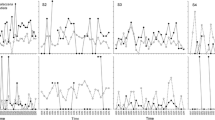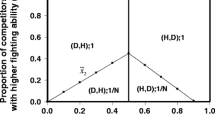Abstract
Fight theory predicts that asymmetries between contestants can be used to predict the winners and losers in fights. Using the monogamous convict cichlid (Amatitlania nigrofasciata), we examined whether being in a pair bond has an advantage in defeating a single same-sex individual. We hypothesize that the male and female members of a pair bond would defeat a same-sex single intruder because it is beneficial to form a pair bond prior to competing for mutual resources, such as a breeding site. To test our hypotheses, we allowed paired males to engage in contests with single males with and without the interaction of their mate. In addition, we allowed paired females to engage in contests with single females with and without the interaction of their mate. Our results indicate that the paired male gained no advantage in being paired; however, paired females seem to have an advantage over single females because they typically defeated them. To reduce the influence of the other pair member on the fight, we restrained one member and allowed the other pair member to confront the same-sex individual. The paired male was frequently defeated while the paired female typically won. These results suggest that forming a pair bond gives females, but not males an advantage in fights with same-sex competitors.



Similar content being viewed by others
References
Carlisle TR (1985) Parental response to brood size in cichlid fish. Anim Behav 33:234–238
Cleveland A (2003) Courtship to divorce: the effect of sex ratio on the pre-spawning behavior of a serially monogamous fish (Archocentrus nigrofasciatus). Dissertation, Lehigh University, Bethlehem, Pennsylvania
Draud M, Lynch P (2002) Asymmetric contests for breeding sites between monogamous pairs of convict cichlids (Archocentrus nigrofasciatum, Cichlidae): pair experience pays. Behaviour 139:861–873
Draud M, Macias-Ordonez R, Verga J, Itzkowitz M (2004) Female and male Texas cichlid (Herichthys cyanoguttatum) do not fight by the same rules. Behav Ecol 15:102–108
Enquist M, Jakobsson S (1986) Decision making and assessment in the fighting behavior of Nannacara anomala (Cichlidae, Pices). Ethology 72:143–153
Enquist M, Leimar O (1987) Evolution of fighting behavior: the effect of variation in resource value. J Theor Biol 127:187–205
Gagliardi-Seeley JL, Itzkowitz M (2006) Male size predicts the ability to defend offspring in the biparental convict cichlid (Archocentrus nigrofasciatus). J Fish Biol 69:1239–1244
Haley MP (1994) Resource-holding power asymmetries, the prior residence effect, and reproductive payoffs in male northern elephant seal fights. Behav Ecol Sociobiol 34:427–434
Itzkowitz M (1984) Parental division of labor in monogamous fish. Behaviour 89(3):251–260
Itzkowitz M, Draud MJ (1992) Conspecific intruders influence pair formation in a monogamous fish. Behav Process 28:59–64
Itzkowitz M, Vollmer G, Rios-Cárdenas O (1998) Competition for breeding sites between monogamous pairs of convict cichlids (Cichlasoma nigrofasciatum): Asymmetries in size and prior residence. Behaviour 135:261–267
Leiser JK, Gagliardi JL, Itzkowitz M (2004) Does size matter? Assessment and fighting in small and large size-matched pairs of adult male convict cichlids. J Fish Biol 64:1339–1350
Mathews LM (2002) Territorial cooperation and social monogamy: factors affecting intersexual behaviors in pair-living snapping shrimp. Anim Behav 63(4):767–777
Mackereth RW, Keenleyside MHA (1993) Breeding territoriality and pair formation in the convict cichlid (Cichlasoma nigrofaciatum; Pisces, Cichlidae). Can J Zool 71(5):960–967
McDonald AL, Heimstra NW, Damkot DK (1968) Social modification of agnostic behaviour in fish. Anim Behav 16:437–441
McKaye KR (1977) Competition for breeding sites between the cichlid fishes of Lake Jiloa, Nicaragua. Ecology 58:291–302
Morley JI, Balshine S (2002) Faithful fish: territory and mate defense favour monogamy in an African cichlid fish. Behav Ecol Sociobiol 52(4):326–331
Neil SJ (1984) Field studies of the behavioral ecology and agonistic behavior of Cichlasoma meeki (Pisces: Cichlidae). Environ Biol Fish 10(1–2):59–68
Parker GA (1974) Assessment strategy and the evolution of fighting behaviour. J Theor Biol 47:223–243
Perrone M (1978) Mate size and breeding success in a monogamous cichlid fish. Environ Biol Fish 3:193–201
Riechert SE (1979) Games spiders play II: resource assessment strategies. Behav Ecol Sociobiol 6:121–128
Santangelo N, Itzkowitz M (2004) Sex differences in the mate selection process of the monogamous, biparental convict cichlid, Archocentrus nigrofasciatum. Behaviour 141:1041–1059
Smith MJ, Parker GA (1976) The logic of asymmetric contests. Anim Behav 24:159–175
Townshend TJ, Wootton RJ (1984) Effects of food supply on the reproduction of the convict cichlid, Cichlasoma nigrofasciatum. J Fish Biol 24(1):91–104
Triefenbach F, Itzkowitz M (1998) Mate switching as a function of mate quality in convict cichlids, Cichlisoma nigrofasciatum. Anim Behav 55(5):1263–1270
van Breukelen NA, Draud M (2005) The roles of male size and female eavesdropping in divorce in the monogamous Convict Cichlid (Archocentrus nigrofasciatus, Cichlidae). Behaviour 142(8):1023–1041
Wisenden BD (1994) Factors affecting reproductive success in free-ranging convict cichlids (Cichlasoma nigrofasciatum). Can J Zool 72:2177–2185
Wittenberger JF, Tilson RL (1980) The evolution of monogamy: hypotheses and evidence. Annu Rev Ecol Syst 11:197–232
Author information
Authors and Affiliations
Corresponding author
Additional information
Ethical standards
All of the experiments performed in this manuscript follow the laws and regulations of the United States of America.
Rights and permissions
About this article
Cite this article
Gagliardi-Seeley, J., Itzkowitz, M. Does being paired give male and female convict cichlids (Amatitlania nigrofasciata) an advantage when competing against same-sex individuals?. acta ethol 12, 115–120 (2009). https://doi.org/10.1007/s10211-009-0065-6
Received:
Revised:
Accepted:
Published:
Issue Date:
DOI: https://doi.org/10.1007/s10211-009-0065-6




